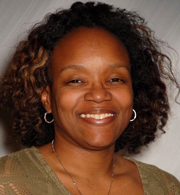
Collaborative Learning
By Ruth Shannon | May 2024
 Collaborative: To work jointly with others or together especially in an intellectual endeavor.
Collaborative: To work jointly with others or together especially in an intellectual endeavor.Learning: To gain knowledge or understanding of or skill in by study, instruction, or experience; to come to realize.
“Collaboration is the essence of life. The wind, bees and flowers work together, to spread the pollen.”
― Amit Ray, “Mindfulness Living in the Moment - Living in the Breath”
As change agents, school counselors possess purposeful passion. For me, the change I desire to see can feel at some moments as though the goal post continuously moves. My concern was my African American neurodiverse students (autism); specifically, based on the data, gaps in their overall growth required my attention. When I became still and reflected on my frustration, the school community and the work required to transform hearts and minds, I thought about that goal post and remembered that there is a team on the field working together to win. So I contacted nurse practitioners, clinical psychologists and social workers to collaborate, learn and create an action plan to address the care gap.
We learned that, historically, Black adolescents diagnosed with autism spectrum disorder (ASD) have encountered difficulties in navigating school, social and healthcare systems to access the necessary resources. One reason may be that Black adolescents are diagnosed at an older age compared to children from other ethnic groups; thus, they may lack timely and appropriate referrals for services. Failure to provide evidence-based mental health treatment to Black youth with ASD stems from many causes, including structural inequities (racism, prejudice, bias, and discrimination) and lack of access to services (availability of specialist providers, insurance, leave from work, and transportation). Not only are there disparities in timing of the diagnosis of autism for Black youth, but there is also a higher rate of misdiagnosis, with the most common being ADHD, adjustment disorder and conduct disorder.
I shared the data with my administration and collaborated with a local clinical psychologist to provide assessments at a deeply discounted rate for each student diagnosed with Autism, ADHD, conduct disorder or adjustment disorder. We hosted an event for our parents of neurodiverse students and presented interventions such as applied behavioral analysis, social skills training, sensory integration therapy, and community-based programs, researched with a culturally responsive lens.
We learned that of the students assessed, our ASD students also were challenged with co-occurring disorders, most commonly anxiety. And for the students diagnosed with ADHD, adjustment disorder or conduct disorder, most had a learning disorder; seven were misdiagnosed. Parents were grateful, and we provided special education teachers with the data and developed an action plan. We met at 6-week intervals to assess progress and make adjustments as necessary. I am so thankful to have realized that the work is always better together. Who will you collaborate with for the win?
Please contact the author for references for this article.
Contact Ruth Shannon of Ahava Soul in Chicago and chair of the ISCA Race & Equity Committee at rshannon247@gmail.com.